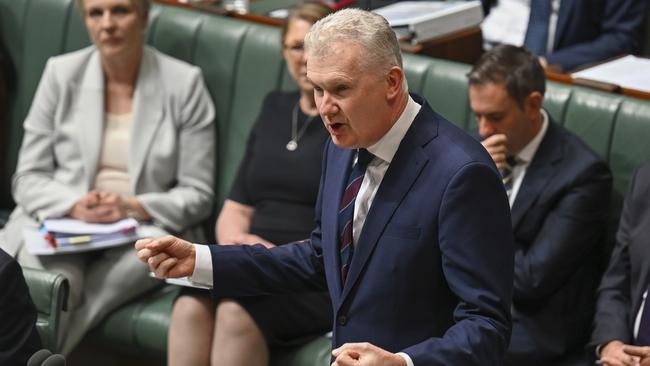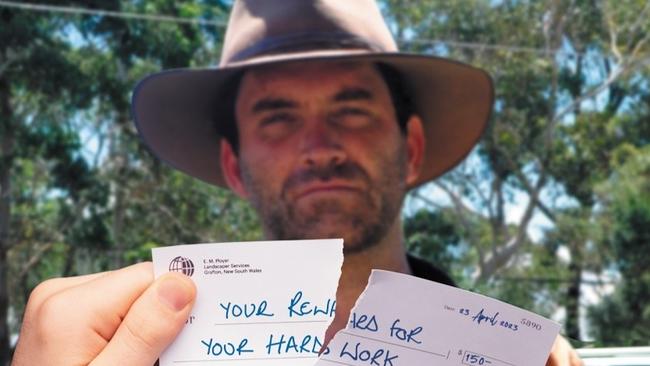Same job, same pay IR rules to smash productivity and jobs
Miners, builders and business leaders ramp-up attacks on Labor’s same job, same pay labour hire crackdown, warning it will smash flatlining productivity and trigger mass job losses.

Miners and builders in the crosshairs of Tony Burke’s same job, same pay reforms have warned the government its labour hire crackdown will smash flatlining productivity rates, trigger mass job losses, drive-down wages and restrict access to contractors.
As the mining and construction sectors on Thursday ramp-up their opposition, Australian Industry Group chief executive Innes Willox said a “heavy handed same job, same pay requirement could destroy many small businesses and the livelihoods of many business owners”.
Mr Willox said industry confusion over same job, same pay changes was because the government “does not yet have a clear idea itself” about how it will implement the changes.
“The concept that a worker who has built up their skills over a long career must be paid the same as someone who is on their first day on the job is both alarming and ludicrous,” Mr Willox told The Australian.
“As part of the government’s consultation process, the Department of Employment and Workplace Relations has prepared a paper which floats a number of deeply troubling possible ways that the scheme could be implemented.
“It is accordingly understandable that, while its policy has been championed by unions, it has caused many employers to view it as likely amounting to an unfair attack on the labour hire sector, as well as the businesses and employees that rely on it.”
The mining and construction industries – Australia’s biggest economic growth contributors – have raised concerns directly with the government that its IR crackdown could force contractors and labour-hire companies to exit the market and potentially result in the “immediate loss of tens of thousands of jobs”.
Mr Burke this week rejected the industry-wide campaign against Labor’s IR reforms, declaring the national advertising blitz as “plain loopy”.
The Workplace Relations Minister said the government’s proposed changes were about “closing loopholes” and rejected claims that more experienced workers would miss out on higher pay.

In its submission to Mr Burke’s department, the Minerals Council of Australia said flaws in the reforms would “not only be damaging for businesses, they will also impose perverse unintended consequences on workers, including devastating collective bargaining”.
The MCA said this would promote “further outsourcing and, ultimately, less secure and less well-paid jobs”. “The loss of flexibility in production capacity in industries such as resources will drastically reduce their productivity. This will have implications for the competitiveness of Australia on a global scale.”
“The Bill will have a direct impact on investment decisions – there will be less new investment in Australian projects.
“Companies will weigh up the marginal benefits of a new project in Australia, compared to an equivalent investment elsewhere.”
With businesses reporting labour shortages, Master Builders Australia told the government: “There is a real risk the changes will apply to independent and subcontracting in building and construction, which is a longstanding, legitimate and lawful engagement.
“If this happens, it will hurt small business, stifle productivity, drive down wages and drive up the cost of construction. It makes no sense that you have to pay two tradies working on a construction site the same amount even if one has just started and the other has worked in the industry for decades,” acting MBA chief executive Shaun Schmitke said.
“This acts as a disincentive for businesses to take on younger workers and hesitation to provide wage increases for more experienced workers.”
Mr Schmitke said with Australians already doing it tough, “why are we proposing even more red tape for business that will ultimately end up hurting workers?
“We should be addressing the productivity challenges in the sector not bulldozing the industry.”

Mr Willox said same job, same pay was “causing concern across the economy and among businesses large and small who utilise labour hire”.
The AiGroup chief executive said most businesses “don’t utilise labour hire arrangements out of any calculated intent to undercut the wages of their directly employed staff”.
“Many use it because they are still struggling with crippling labour shortages. Labour shortages remain a major impediment to our economy and to efforts to obtain sorely needed productivity improvements,” he said.
“The labour hire industry provides part of the solution to this problem and is helping to keep our increasingly fragile economy moving. A same job, same pay requirement has the potential to result in widespread job losses among labour hire employees.”




To join the conversation, please log in. Don't have an account? Register
Join the conversation, you are commenting as Logout